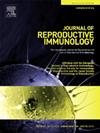Evaluation of peripheral NK tests offered to women with recurrent pregnancy loss and a search for novel candidate biomarkers
IF 2.9
3区 医学
Q3 IMMUNOLOGY
引用次数: 0
Abstract
Recurrent pregnancy loss (RPL) is a common condition of largely undetermined pathogenesis. There is prior evidence of association with immune dysregulation linked to elevated NK cell levels and cytotoxicity. However, experimental findings remain contentious, hindering clinical adoption of immunological testing. Given their importance in healthy pregnancy, this study set out to determine the clinical utility of NK cell assays in 100 non-pregnant women with RPL and 80 healthy control women and establish an exploratory mass cytometry panel for in-depth NK phenotyping. As previously described, peripheral NK cell elevation was observed with RPL. The augmented NK cell cytotoxicity, often referenced, was undetectable, although enhanced degranulation was observed. Reduced cytolytic molecule secretion by PBMCs was seen in RPL, possibly counterbalancing the increased NK cell degranulation. Mass cytometry was employed for the detailed investigation of NK cell phenotype, focused on inhibitory and activating receptor expression. Augmented prevalence of CD57+ mature cytotoxic NK cells was present in the RPL cohort. This was accompanied by elevated prevalence of subsets lacking inhibitory receptor expression, indicating enhanced NK cell responsiveness to activating signalling. Additionally, CXCR3/CXCR4+ subset reduction, suggested potential uterine migration defects. This extensive analysis of peripheral NK cells in RPL has revealed significant dysregulation affecting both total number and potential activity. The extent to which this dysregulation is reflected in utero requires further examination. Current findings will be used to guide subsequent investigations on paired peripheral and endometrial samples as well as biomarker discovery to improve our capacity to estimate risk of a following loss.
评估外周NK测试提供给妇女复发性妊娠丢失和寻找新的候选生物标志物。
复发性妊娠丢失(RPL)是一种常见的疾病,其发病机制尚未确定。先前有证据表明免疫失调与NK细胞水平升高和细胞毒性有关。然而,实验结果仍然存在争议,阻碍了免疫学检测的临床应用。考虑到NK细胞检测在健康妊娠中的重要性,本研究在100名患有RPL的非妊娠妇女和80名健康对照妇女中确定了NK细胞检测的临床应用,并建立了一个探索性的细胞计数小组来进行深入的NK表型分析。如前所述,RPL观察到外周NK细胞升高。增强NK细胞的细胞毒性,经常被引用,是检测不到的,虽然增强的脱颗粒被观察到。RPL中PBMCs的细胞溶解分子分泌减少,可能抵消了NK细胞脱颗粒的增加。采用细胞计数技术对NK细胞的表型进行了详细的研究,重点关注抑制和激活受体的表达。在RPL队列中,CD57+成熟细胞毒性NK细胞的患病率增加。这伴随着缺乏抑制性受体表达的亚群的患病率升高,表明NK细胞对激活信号的反应增强。此外,CXCR3/CXCR4+亚群减少提示潜在的子宫迁移缺陷。RPL中外周NK细胞的广泛分析揭示了影响总数和潜在活性的显着失调。这种失调在子宫内反映的程度需要进一步研究。目前的发现将用于指导后续对配对外周和子宫内膜样本的调查,以及生物标志物的发现,以提高我们估计后续损失风险的能力。
本文章由计算机程序翻译,如有差异,请以英文原文为准。
求助全文
约1分钟内获得全文
求助全文
来源期刊
CiteScore
6.30
自引率
5.90%
发文量
162
审稿时长
10.6 weeks
期刊介绍:
Affiliated with the European Society of Reproductive Immunology and with the International Society for Immunology of Reproduction
The aim of the Journal of Reproductive Immunology is to provide the critical forum for the dissemination of results from high quality research in all aspects of experimental, animal and clinical reproductive immunobiology.
This encompasses normal and pathological processes of:
* Male and Female Reproductive Tracts
* Gametogenesis and Embryogenesis
* Implantation and Placental Development
* Gestation and Parturition
* Mammary Gland and Lactation.

 求助内容:
求助内容: 应助结果提醒方式:
应助结果提醒方式:


